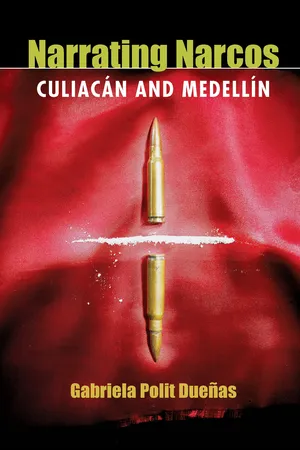
- English
- PDF
- Available on iOS & Android
About This Book
Narrating Narcos presents a probing examination of the prominent role of narcotics trafficking in contemporary Latin American cultural production. In her study, Gabriela Polit Due–as juxtaposes two infamous narco regions, Culiacan, Mexico, and Medellin, Colombia, to demonstrate the powerful forces of violence, corruption, and avarice and their influence over locally based cultural texts. Polit Due–as provides a theoretical basis for her methods, citing the work of Walter Benjamin, Pierre Bourdieu, and other cultural analysts. She supplements this with extensive ethnographic fieldwork, interviewing artists and writers, their confidants, relatives, and others, and documents their responses to the portrayal of narco culture. Polit Due–as offers close readings of the characters, language, and milieu of popular works of literature and the visual arts and relates their ethical and thematic undercurrents to real life experiences. In both regions, there are few individuals who have not been personally affected by the narcotics trade. Each region has witnessed corrupt state, police, and paramilitary actors in league with drug capos. Both have a legacy of murder.Polit Due–as documents how narco culture developed at different times historically in the two regions. In Mexico, drugs have been cultivated and trafficked for over a century, while in Colombia the cocaine trade is a relatively recent development. In Culiacan, characters in narco narratives are often modeled after the serrano (highlander), a romanticized historic figure and sometime thief who nobly defied a corrupt state and its laws. In Medellin, the oft-portrayed sicario (assassin) is a recent creation, an individual recruited by drug lords from poverty stricken shantytowns who would have little economic opportunity otherwise. As Polit Due–as shows, each character occupies a different place in the psyche of the local populace. Narrating Narcos offers a unique melding of archival and ground-level research combined with textual analysis. Here, the relationship of writer, subject, and audience becomes clearly evident, and our understanding of the cultural bonds of Latin American drug trafficking is greatly enhanced. As such, this book will be an important resource for students and scholars of Latin American literature, history, culture, and contemporary issues.
Frequently asked questions
Information
Table of contents
- Cover
- Contents
- Acknowledgments
- Introduction
- 1. The Places
- 2. The Book in Three Culichi Novels
- 3. The Author, the Crime, the Idiot, and the Language of the Narcos
- 4. Dealing with Everyday Violence: The Journalist and the Painter
- 5. The Epics of Two Highlanders: Cástulo Bojórquez and Ramón Guerrero
- 6. The Problematic Emergence of Sicarios in Colombia
- 7. Love and Letters in the Times of Narcos
- 8. Gender and Genre in Héctor Abad Faciolince’s Angosta
- 9. Playing with Stereotypes
- Epilogue
- Notes
- Works Cited
- Index
- Back Cover